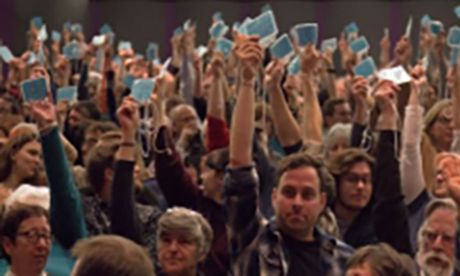Reports
You are here
QS convention and radical independence

December 5, 2017
On December 1 to 3, around 600 delegates of Quebec solidaire (QS) gathered on the south shore of Montreal for a special convention to accomplish two things: one a vote on a merger with another electoral party formed out of disillusionment with the PQ, and the other to approve the electoral platform for the Quebec election of October 1, 2018.
This will be a historic election for QS one way or the other: expectations are raised since the exponential growth in membership since the spring when 2012 student strike leader Gabriel Nadeau-Dubois threw his lot in with QS and right after stood in a by-election and won a seat in the National Assembly. At the same time, QS started polling first or second in the 18-35 voter demographic. Of course the lower end of this demographic has historically been the lowest turn out at the polls.
Ballot and street
QS has always intended to be a party of the ballot and a party of the street, to give voice to movements in the Assembly. It has succeeded in doing so on numerous occasions, but the upcoming election is commanding a lot of attention from a new party that needs to prove that it is going forward, not backward, at the ballot.
QS is an extremely democratic party and spent 10 years elaborating its programme. The electoral platform reflects that too: it is much more detailed than mainstream left party platforms as it is intended not as an electoral campaign document but as a commitment to what an elected QS government would actually attempt to do during a 4-year mandate if it were elected. Some of this is not only more detailed but more radical that what the actual electoral campaign will focus on.
The campaign, like all campaigns in the mainstream arena, dominated by soundbites and photos ops, will be to connect with the anger of working class people who don't have lots of time to examine detailed platforms or programs but whose anger will be courted by the other non-traditional party competing with QS: the Coalition pour l'avenir du Quebec (CAQ).
The CAQ also sees the crumbling allegiances with the Quebec Liberals and PQ. They are a right-wing party a la Trump that seeks to guide that anger back towards neo-liberalism and austerity, but one that is targeting voters with an electoral machine much larger that QS has.
But what QS has, that leaves all three of those capitalist parties in the dust, is its potential strength on the ground. The strength to get out there and talk to people who feel excluded by the political establishment, the people who Bernie Sanders and Jeremy Corbyn reached.
The priorities of QS's actual electoral campaign will be more focussed than what was discussed at this convention. But there was an understanding of where those pressure-points lie, and they were expressed both by members at the mic and by QS spokespeople Manon Masse and Gabriel Nadeau-Dubois.
Merger with Option national
However, the story that reached the media in Quebec at this convention was the vote to approve a merger with Option national (ON), a party that shares many of the same values of QS but puts more emphasis on independence from the colonialism of the Canadian state as a goal in itself. QS emphasizes independence as a tool for a radically progressive government to implement policies that will immediately contradict the interests of Canadian federalism.
The vote for a merger passed by a large majority. Obviously there was a desire for a merger of the Quebec left against the right, but there was also much careful discussion about the details of the actual merger deal.
During the debate, one intervention stood out: “Until last night I wasn’t sure why I felt like a supporter of Quebec independence. I don’t support any kind of Quebec identity. But then I heard from our speakers from Catalonia, that it’s about what kind of society we want, and that the one we are in is broken.”
Catalonia
The opening night of the QS convention was given over to two women representatives from the struggle for self-determination in Catalonia, of the CUP, Candidatura d'Unitat Popular. They represent a group within the independence movement that, like QS, is also anti-capitalist. One said: “we are in a fight against the Spanish state, not against the Spanish people.”
They also talked about the fact that the history of the Spanish state is marked by the expulsion of Muslims and Jewish people. And the fact that the Western “concern” for fascism left the Franco regime after WW2 intact. And they thanked the MacKenzie-Papineau battalion, francophone and Anglophone volunteers who went to Spain to stop Franco in the 1930s, despite opposition from the Canadian government at the time.
The speakers from Catalonia finished by saying: we are not more special or more important than the Palestinians or the Kurds. But if there can be such a denial to fundamental democratic rights in Western Europe, then where can democracy survive ?
Democracy is always more than a vote, more than a referendum. Firstly, it’s about the right to cast that vote. Secondly, real self-determination is about what that vote becomes in the hands of actual people, and that will not always be decided by existing law, but by the people who determine what kind of society they want.
QS’s slogan coming out this last convention is “Vivre mieux, ce n’est pas un rève”: “A better life is not just a dream.”
Helping people believe in a realistic dream both on the ballot and in the streets, is something QS is aiming to do in 2018. But the path forward will continue to be full of struggle and debate, like all movements for a better world that challenge the priorities of capitalism from within the political structures created by it.
Section:










